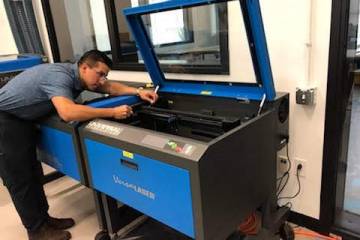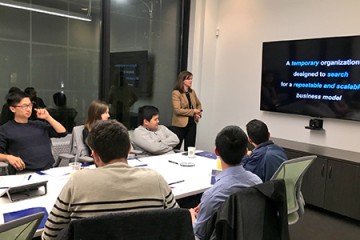For aspiring entrepreneurs, the thought of building a company from scratch can be daunting. What if no one wants to buy what you're selling? Where will the money come from to grow the business? And what will happen if you fail?
To get some answers, we talked to six Johns Hopkins Carey Business School alumni who have seen it all before. These seasoned entrepreneurs told us their stories, from choosing the right business idea to raising venture capital, and shared their best advice for launching a successful startup.
Every successful company begins with a great idea, but how to choose that idea is up for debate. Billionaire tech entrepreneur and Shark Tank co-star Mark Cuban is known for dishing out this unorthodox piece of advice: Don't follow your passion. He tells aspiring entrepreneurs to devote their energy instead to something they're naturally good at. Carey alum Jack Hirsch, a member of the charter Global MBA class of 2012, would respectfully disagree.
"Before you start a company, make sure that you're solving a problem that is already keeping you up at night," says Hirsch, who developed software to help people find lost computer documents at work. While most people wouldn't lose sleep thinking about a better way to search for files, it was a problem Hirsch was excited to solve.
"Somewhere between 30 to 50 percent of knowledge workers' time is spent finding information at work. A lot of that information lives in documentation, and that documentation is siloed away somewhere you can't find it," he explains, using the same pitch details that landed him millions in seed funding for his startup, Butter.ai.
Not only was Hirsch passionate about saving workers' time, but he was also following part of Cuban's advice by pursuing something he was naturally good at—programming and technology. The combination proved to be a winning formula. Less than a year after he launched Butter.ai in 2016, the company gained enough traction to get acquired by the cloud storage company Box.

Angel investor Karen Appleton Page, who graduated with her MBA from Johns Hopkins in 1997, agrees that entrepreneurs like Hirsch need to be passionate to garner her attention, but she says a keen understanding of the marketplace can be even more important than a good business idea.
"Where is there a problem, and why? And what are you proposing to do to solve or change that?" she asks. "In order to understand what the problem is, you've got to start talking to people who feel the pain of that problem. … You need some validation."
A veteran business development executive, Appleton Page joined Box in 2007 as its eighth employee. She cashed in eight years later when the company went public with a valuation of $1.7 billion. Today she pays it forward by mentoring entrepreneurs and funding early-stage startups.
For serial entrepreneur Clarence Wooten, who graduated in 1998, coming up with business ideas has always been the easy part. The challenge is finding an idea that stands up to scrutiny and is fundable.
"I'm an ideas person. They just come out of me," says Wooten, who has launched more than a half-dozen companies in the past 25 years. "After I come up with a great idea, I usually spend a couple weeks trying to talk myself out of it, and if I can't talk myself out of it, I become convinced that it's something the world needs."
Get ready to hustle
Once you have an idea you believe in, the real work begins. For most entrepreneurs, that journey starts with exhaustive networking, research, and fundraising.
Wooten, a Baltimore native, says he went "from Silicon Valley to Silicon Alley" trying to raise money for Image Café, an online marketplace of template-based websites for small businesses, which he thought up as an undergrad at Johns Hopkins.
As an African-American, Wooten has been an outlier in the world of California tech startups, which faces criticism to this day for its lack of diversity. He readied himself for Silicon Valley by reading the Michael Wolff memoir Burn Rate and scouring the internet for venture capitalists using Alta Vista (this was 1998, when Google was still in its infancy).
"No one in my family had the means to invest in any of my businesses. I literally had to build a brand new network from scratch of high net-worth individuals, which is not the easiest thing to do when you don't come from that world," he recalls. "I didn't even know if I fit the description of the kind of guy you would write a check to in the tech industry. I didn't look like Mark Zuckerberg, that's for sure."
He raised $750,000 by pitching his idea to angel investors. Image Café launched in April of 1999—near the height of the dot-com boom—and seven months later it was acquired for $23 million by Network Solutions/Verisign.
"Timing is everything," says Wooten, who had become a millionaire seemingly overnight. "It definitely set my course as an entrepreneur. I knew I would never work for anybody again."
To raise venture capital, entrepreneurs first need to land meetings with investors; that's where research and networking come in, says Appleton Page. She tells people to start by identifying firms that offer seed funding and align philosophically with their company's mission. From there it's about working contacts—LinkedIn, friends, relatives, and business school connections—to see who can create a pathway for an introduction.
"Once you get the introduction, then you're on," says Appleton Page. As an angel investor, she offers funding to about half the entrepreneurs who pitch to her in person. "By the time a pitch gets to me, it's pretty much been validated by my network or by my community."
Unfortunately, not all pitch meetings go well.
"There's no amount of emotional preparation that will make it feel OK when you go into a pitch meeting and they laugh you out of the room," says Hirsch, who pitched his startup, Butter.ai, more than 70 times. Without a boss doling out motivation and reassurance, you need a lot of personal determination to keep pushing forward, he says.
"You need grit," Wooten advises. "That's the bottom line. I would say the less affluent and connected you are, the more grit you need to make up for that."
Grow at the right pace
Mehr Pastakia, who received her MBA in 2016, was determined to grow her green roofing business cautiously, in large part because she was financing everything herself.
She launched Pratum Greenroofs in 2012 while she was a student at Carey, starting with a rooftop makeover at the Legg Mason Tower, Carey's home building in Baltimore. When the business began to grow, she rented a cheap co-working space for $500 a month and decided to invest as little money as possible up front.
"One of the challenges in starting and scaling a business is what comes first, the chicken or the egg? Do the contracts come first, or does the infrastructure to sell work and implement more work come first? If you focus on the latter earlier on, then you end up taking on debt," she says.
Being financially conservative worked for Pastakia. In less than three years, Pratum landed contracts to maintain more than a dozen green roofs for several prominent Mid-Atlantic property developers and management firms. "One of my successes is that I didn't owe anybody any money at the end of the day," she says.
Entrepreneurs should avoid raising capital unless they absolutely need to, advises serial entrepreneur Pat Sidhu, who received an MS in finance in 1993. He has made millions starting companies from scratch and selling them, and says that while getting outside investments can broaden your network, it also gives you less control over your company.
"Don't do it for the hype. Do it because it really makes business sense," recommends Sidhu, whose businesses have run the gamut from kidney dialysis to mortgage lending to educational services.
Even startups with plenty of venture funding should be careful not to over-invest early. Nearly 75% of high-growth internet startups fail because of premature scaling, while startups that scale properly grow about 20 times faster than their peers, according to a 2011 report by Startup Genome, an Oakland, California-based organization that studies "startup ecosystems."
"If you have the ability to raise capital, raising too much can be an early death knell. It can set expectations too high. It can force a frantic search for growth," warns Hirsch. "Oftentimes you bring more people in and invest more heavily … in things that can mask failure."
He also recommends engaging with potential customers early, even if your product isn't ready to launch. To drum up enthusiasm for Butter.ai, he published an article on Medium.com that led thousands of people to sign up for updates. Those signups eventually became his first customers.
Entrepreneurs should always plan ahead and expect the unexpected, advises Sidhu. Without the right resources, new companies won't have the flexibility to adapt to unforeseen changes in the market.
What you believe the market is, is rarely how it ends up. What's your plan B, C, and D? You've got to have those in your head all the time," he says. "You've got to be smarter. Work harder. Work faster."
Fail fast and fail cheap
Sometimes even the best-laid plans can't keep a new business alive—and that's OK. Only 18% of first-time entrepreneurs succeed, according to a 2006 paper by Harvard researchers. The prospects don't improve all that much even for repeat business owners who had a previous company go public: Only 30% succeed with their second effort. In other words, failure is something all entrepreneurs are likely to experience at one point or another.
Hirsch admits to having had "a long string of failures" before his success with Butter.ai. One of his lowest moments was when an online travel startup he was working for, GoPlanit, tanked during the 2008 financial crisis. Three months later he couldn't afford his rent in San Francisco and was forced to move back in with his parents.
"I had been independent, on my own, since the age of 17. So that was a hugely shameful experience for me," he confesses. "There is so much grit that is required to get though those stages."
Wooten is also no stranger to failure. In 2011 he launched a social networking platform, Arrived, and moved his entire team from Maryland to Silicon Valley. A year later, the startup died because it was unable to raise series A funding.

"Failure is part of the process. The key is fail fast and fail cheap," says Wooten, who went on to launch three more companies.
Last summer Sam Huleatt (MBA '08) decided to shutter his New York tech company, Heights Media LLC, which specialized in online advertising using algorithmic trading strategies. After eight years in business, he found that structural market changes and big players like Google made it too difficult to compete. He's working to launch his next entrepreneurial venture.
"The culture is: Hey, it's OK if you fail. You can always try something again or take some of the skills that you learned and apply them in the setting of another company," says Huleatt. "Failing at a startup isn't perceived as negatively as it once was, he adds, especially in the tech world."
Pastakia decided to close Pratum Greenroofs last year after struggling with unforeseen changes in the D.C. market. A new company had popped up with a disruptive rooftop-farming model, and two of the city's biggest roofing contractors shifted their garden maintenance in-house. The high cost of living and doing business in the District was also a contributing factor.
"When I ended Pratum, I was really content with the way that it ended," she says. "The process of having my own business got me to the point where I stopped and took stock of what's really important in life and readjusted my direction."
Take care of yourself
Carey alumni agree that starting a business is always a wild ride. The highs can be euphoric when sales are up and the money is flowing in, but the lows can be downright miserable.
Huleatt remembers an especially tough episode when his first company, Workstreamer Inc., was on the verge of getting acquired in a lucrative buyout. All the documents had been drafted and everything was set to close when the stock market took a nosedive. It was around the time of the 2008 financial crisis, and the deal ended up falling apart.
"You're constantly up and down emotionally," he says. "There's a whole mental health aspect of being an entrepreneur that is really challenging. Generally you're expected to portray things as going really well even when they're not."
Pastakia can relate. She remembers being so focused on her business that she was neglecting other important parts of her life. The stress made it feel like things were always on the verge of collapse.
"You can essentially disassociate from reality because you get so focused on what's going on in your company," she says. "It's very easy to identify yourself by your business … so when things don't go right, it's like, 'I'm not good enough.'"
Running a business can involve grueling work hours as well. One out of five entrepreneurs report working more than 60 hours per week, while nearly half work more than 50 hours per week, according to a 2013 survey by The Alternative Board, a Colorado-based provider of advice and coaching to business leaders.
Pastakia advises fellow entrepreneurs to practice self-care, including exercising and getting enough sleep: "When things start to go wrong, you need to have clear thinking, and you can't think clearly when you're tired."
Savor your successes
For those with an entrepreneurial spirit, few things are more rewarding than starting a company and watching it grow. The alumni say the satisfaction of creating a useful product and being your own boss is hard to beat.
"It's a pretty intoxicating feeling to know that you can take something that was an idea in your brain and turn it into something that can make millions—in a matter of months, in some cases," Wooten says. "Once you get a taste of that success, you see yourself as an employer, not an employee."
For Sidhu, the best part was the validation. In the early 1990s, he struggled to convince his father, a physician, that he should go into business for himself rather than pursue a career in medicine.
"Startup," meaning a new business enterprise, wasn't a widely used term at the time, "so I couldn't explain really what was in my mind," Sidhu remembers. "The most fulfilling part—it wasn't so much the money—it was to say, 'Hey, this is what I was saying I was trying to do.'"
Money wasn't the primary motivator for Hirsch either. He says he has always been more interested in solving the problems he's passionate about.
"There are a lot of people in this world who are not driven by money. They are driven by impact," he says, noting that people who are focused on the money shouldn't start a company. "I could have done just as well financially joining Facebook four years ago … but what's the fun in that?"
At the end of the day, the alumni say, there's only one way to truly learn about starting your own business: Go out and do it yourself.
"You've got to be willing to jump off the cliff," says Wooten. "The more you jump off of cliffs, the more you believe you're going to fly before you hit the ground."
This article originally appeared in Carey Business, the magazine of the Johns Hopkins Carey Business School.
Posted in Science+Technology, Politics+Society
Tagged entrepreneurship, startups










